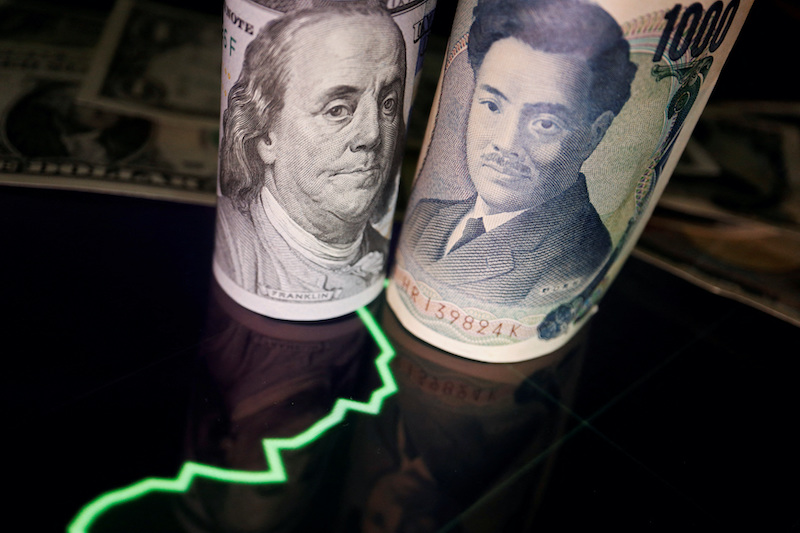The Bank of Japan has conducted a rate check in apparent preparation for currency intervention, the Nikkei newspaper reported on Wednesday.
Policymakers have been stepping up warnings about sharp falls in the yen, it said.
The yen rose slightly from a near 24-year low against the dollar after the report, which cited unidentified sources, and was trading around 143.89 at 0520 GMT.
The currency has depreciated around 20% so far this year, as the Bank of Japan (BOJ) has kept policy super-loose while many of its global peers, such as the US Federal Reserve, have aggressively raised interest rates to combat surging inflation, making Japanese assets less attractive to investors.
Aside from verbal warnings, Japanese policymakers have several options to stem excessive yen falls. Among them is to directly intervene in the currency market, selling dollars and buying up large amounts of yen.
ALSO SEE: How Japan Could Counter ‘Excessive Volatility’ in the Yen
Rate Check
A rate check by the BOJ, a practice in which central bank officials call up dealers and ask for the price of buying or selling yen, is seen in currency markets as a possible precursor to action. When the BOJ made its check, the rate was around 144.9 to the dollar, Jiji news agency said, citing a market source. Nikkei’s report appeared on its website.
“My feeling is that the Ministry of Finance won’t intervene at this stage and will leave it at verbal warnings,” said Takeshi Minami, chief economist at Norinchukin Research Institute in Tokyo. “There’s still a week before the Fed’s rate-setting meeting. I don’t think markets believe the ministry will intervene at current dollar/yen levels.”
Japanese Finance Minister Shunichi Suzuki said earlier on Wednesday that currency intervention was among options the government would consider.
Data issued on Tuesday showing unexpectedly strong US inflation for August prompted bets on the US Federal Reserve raising interest rates higher and for longer, increasing downward pressure on the yen.
Finance Minister Voices Concern
“Recent moves are rapid and one-sided, and we’re very concerned. If such moves continue, we must respond without ruling out any options,” Suzuki told reporters on Wednesday.
“We’re talking about taking all available options, so it’s correct to think so,” Suzuki said when asked whether yen-buying currency intervention was among the government’s options.
The remark was the strongest to date by government officials in signalling the possibility of currency intervention, which markets have nonetheless considered highly unlikely due to the difficulty Tokyo would face in getting agreement from its G7 partners.
Once welcomed for giving exports a boost, the yen’s weakness is becoming a cause for headaches for Japanese policymakers, because it hurts households and retailers by inflating the already rising prices of imported fuel and food.
Yen-buying intervention has been very rare. The last time Japan intervened to support its currency was in 1998, when the Asian financial crisis triggered a yen sell-off and a rapid capital outflow from the region. Before that, Tokyo intervened to counter yen falls in 1991-1992.
- Reuters with additional editing by Jim Pollard
ALSO SEE:
Japan Taps $24bn Reserves to Help Fight Rising Living Costs
Japan Complains to US Over EV Tax Credit Law – Nikkei
Yen Sinks to New 24-Year Low, 140-Mark to Dollar Next, Traders Say
























